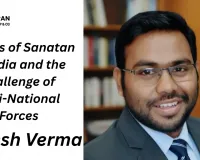Supreme Court Moves Toward Landmark Compensation Framework for Wrongful Convictions in India
Digital Desk

In a historic and morally significant move, the Supreme Court of India is poised to redefine justice for those who have been wrongfully convicted or falsely implicated in criminal cases. The apex court is currently examining whether victims of wrongful imprisonment—individuals who have spent years behind bars based on fabricated evidence or false charges—deserve state compensation for the irreparable loss of freedom, dignity, and livelihood.
This judicial development marks a long-overdue acknowledgment that acquittal alone is not justice. When an innocent person loses years of their life to wrongful incarceration, the damage extends far beyond the courtroom.
It destroys families, shatters reputations, and leaves economic and psychological scars that cannot be erased by mere release from prison.
The Case That Sparked a National Debate
The Supreme Court has taken up three significant cases from different states, each exposing shocking failures within India’s criminal justice system. One of the most heartbreaking involves a man who spent 12 years in jail—six of them under the constant threat of a death sentence—before being acquitted after the discovery of fabricated evidence.
Such cases underscore the devastating human cost of police misconduct and systemic inefficiencies in criminal investigations.
The court has now sought assistance from the Advocate General and the Attorney General of India to frame comprehensive guidelines for awarding compensation to victims of wrongful prosecution.
This initiative aims to fill a glaring gap in Indian law, which currently offers no formal mechanism to compensate those falsely accused or convicted.
State’s ‘Strict Liability’ and Accountability
A central theme in the court’s deliberation is the principle of strict liability—holding the state accountable for the actions of its officials, including police officers who fabricate evidence or prosecute without sufficient cause.
The court’s stance is clear: the government cannot escape responsibility when its machinery fails or abuses its power. This position reinforces the constitutional promise that the state exists to protect, not persecute, its citizens.
A Wake-Up Call for India’s Justice System
India’s conviction rate stands at roughly 54%, meaning nearly half of all prosecutions end without conviction. This statistic reveals deep-rooted flaws in investigation and prosecution processes.
The ongoing case presents a critical opportunity for systemic reform—demanding higher standards of evidence collection, accountability in policing, and fairer treatment of the accused.
Beyond Legal Compensation: Restoring Humanity
Wrongful imprisonment does not only result in financial loss—it destroys lives. Many victims lose their homes, jobs, and mental well-being, while their families suffer social stigma and economic ruin.
The Supreme Court’s willingness to consider both pecuniary and non-pecuniary damages, such as emotional trauma and reputational loss, reflects a holistic understanding of justice.
Looking Ahead: A Landmark Judgment in the Making
The next hearing, expected to take place in late November 2024, could set a historic precedent. If the Supreme Court establishes a formal compensation framework, it would mark a transformative step in Indian jurisprudence—one that balances the scales between citizens and the state.
Such a decision would not only provide long-overdue restitution to victims but also send a powerful message: wrongful convictions are not just judicial errors—they are violations of human rights. India now stands on the threshold of a new era of justice, where accountability and compassion converge to restore faith in the legal system.


.jpg)
.jpg)

.jpg)

.jpg)

.jpg)
